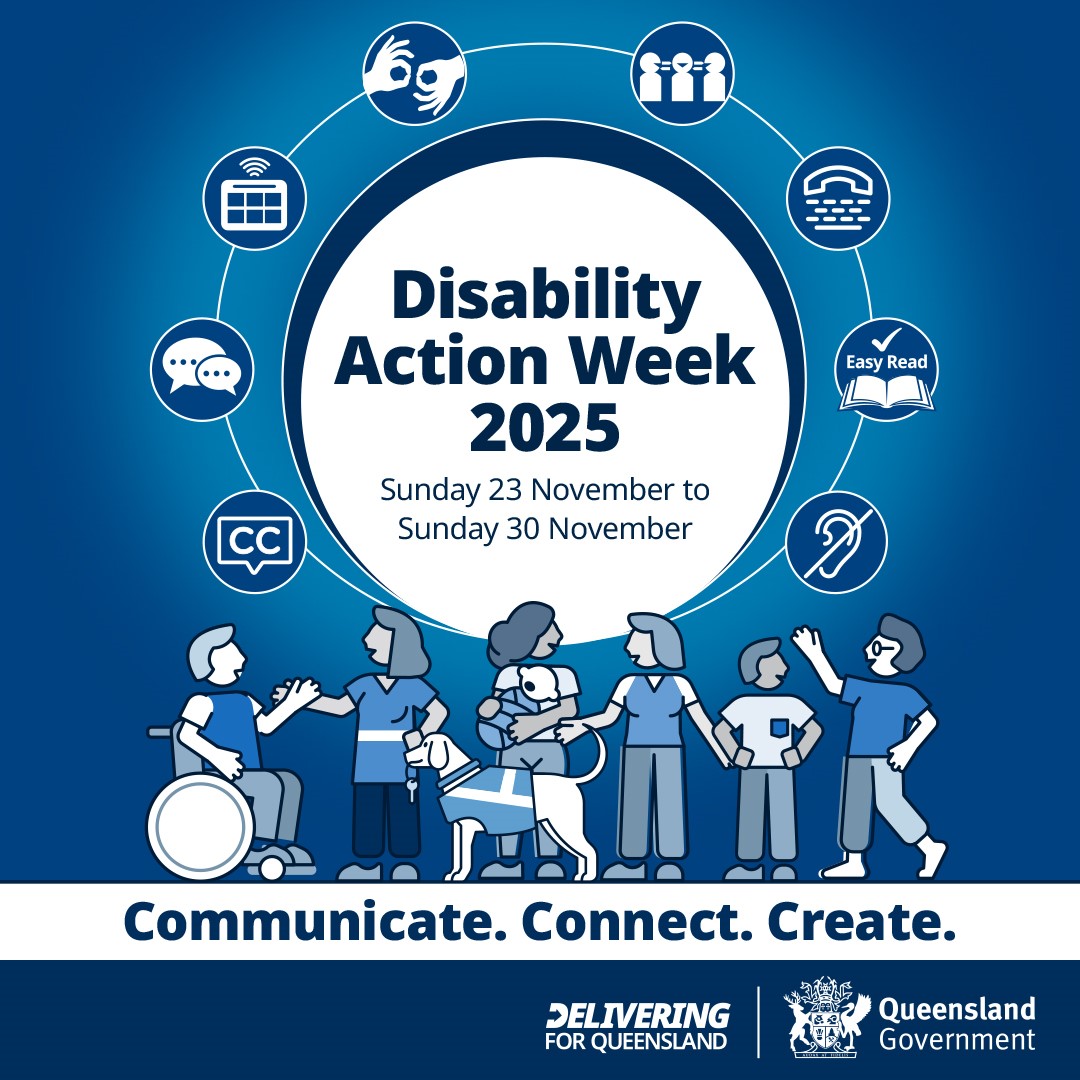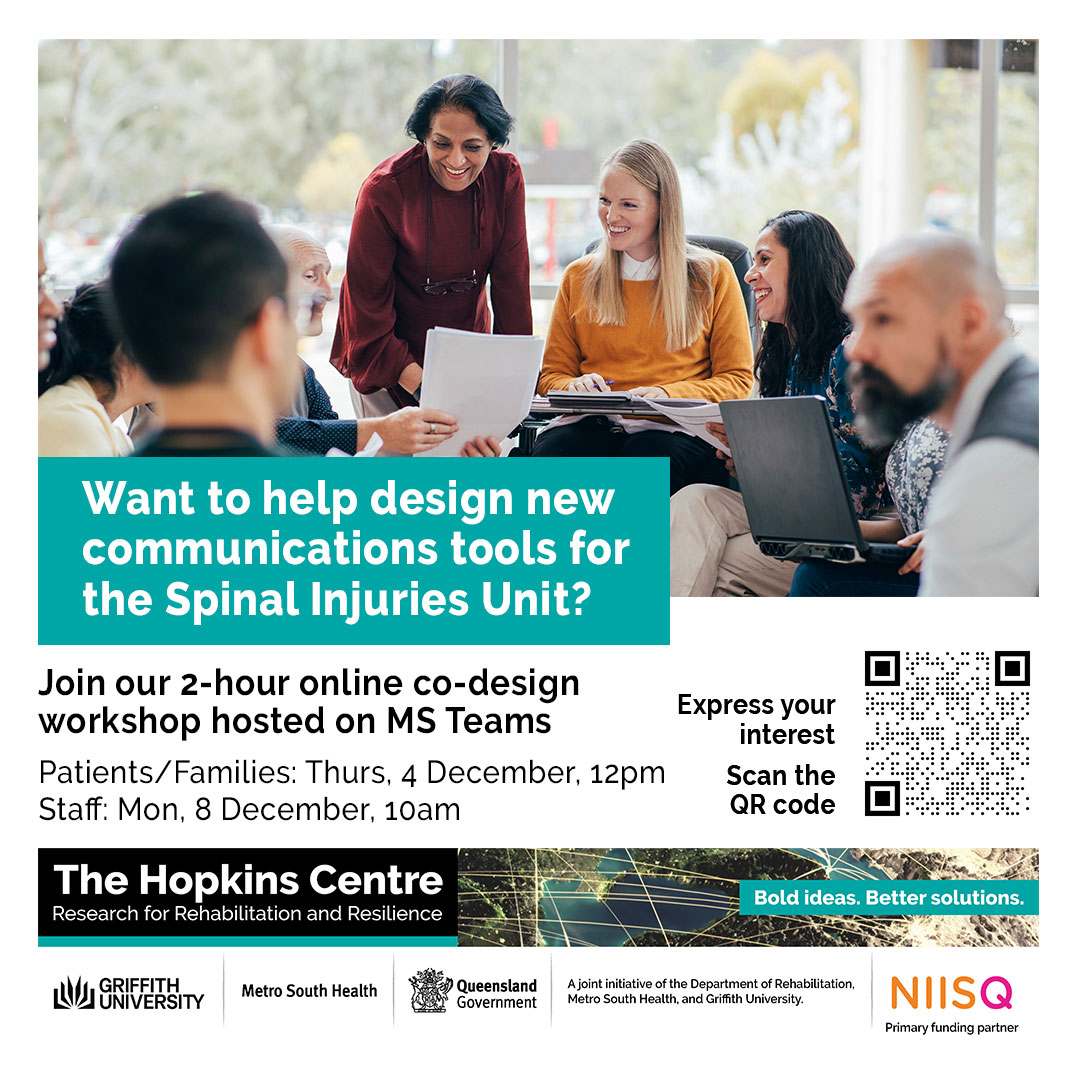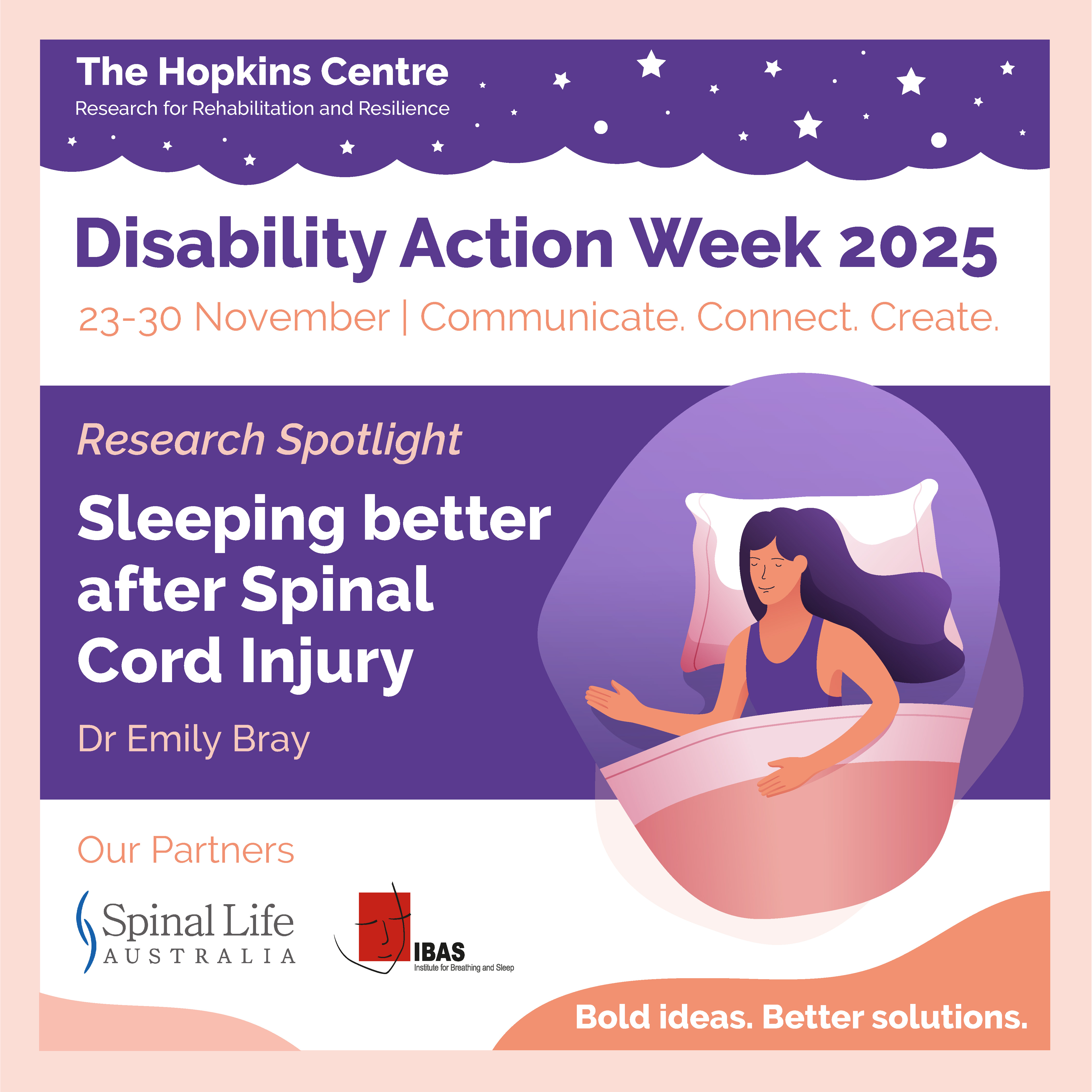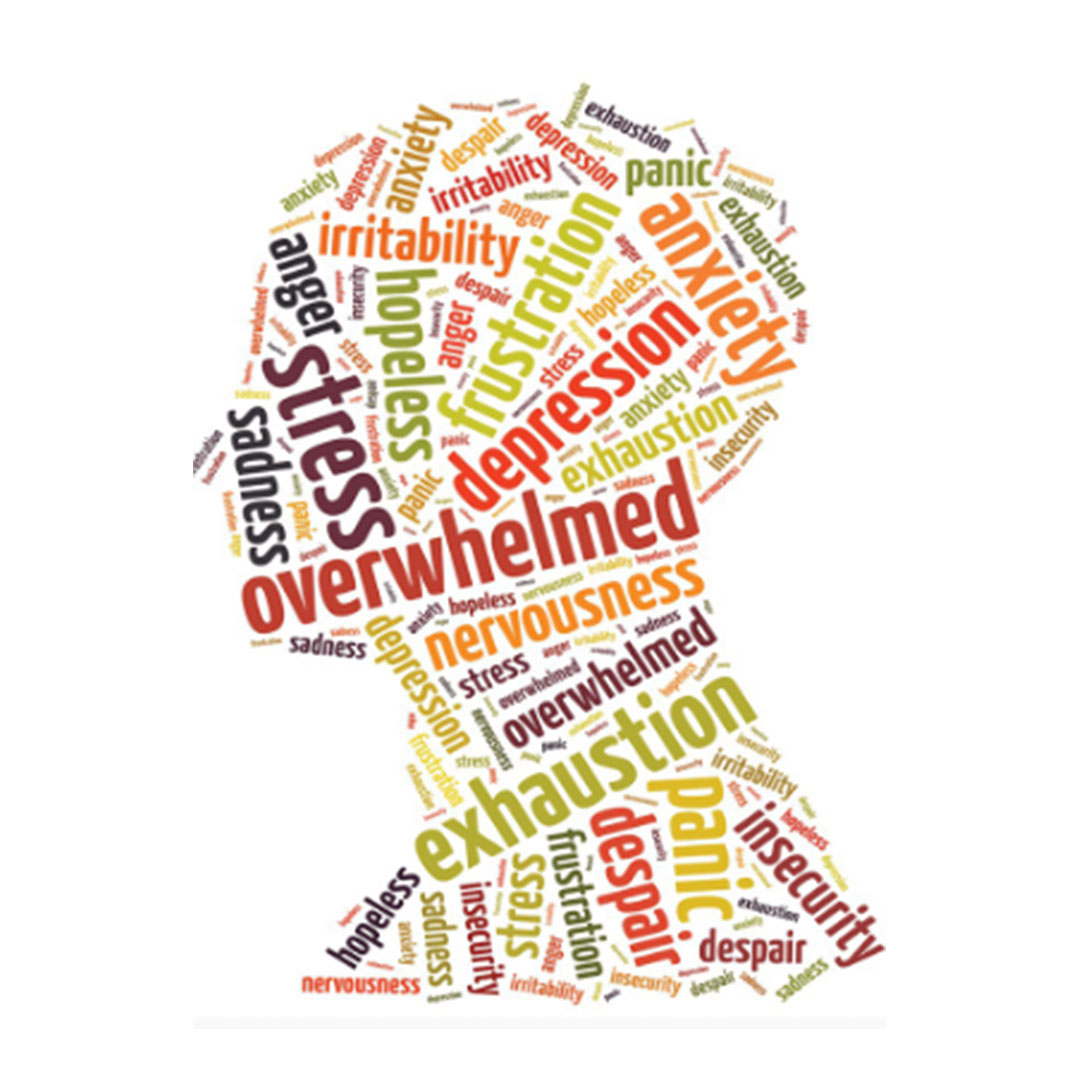Category Queensland Show all
-
Disability Action Week 2025: Communicate. Connect. Create.


Disability Action Week is a statewide celebration of accessibility, inclusion and the simple actions we can all take to make Queensland a place where everyone can participate fully. This year’s theme — Communicate. Connect. Create.— encourages all of us to put accessible communication into practice and recognise its role in building stronger, more inclusive communities.
Small changes matter. By making information easier to understand, offering alternative formats, improving event accessibility, or taking the time to ask someone about their communication preferences, we help create environments where everyone feels welcome, respected and supported.
Shining a Spotlight on Hopkins Research
The Hopkins Centre is a leading translational research centre in disability and rehabilitation, based at Griffith University and Princess Alexandra Hospital. Our work focuses on finding practical solutions to complex challenges through interdisciplinary, collaborative and responsive research that is embedded directly in practice.
While disability and rehabilitation research rarely makes headlines in the same way that medical breakthroughs do, it is essential work. Because we work alongside people with disability, their families, clinicians, policymakers and service organisations, we see firsthand where innovation is needed — and we act on it.
We are committed to valuing the voice of people with disability in every stage of decision-making and discovery. Their insights shape our research, guide our priorities and ensure we develop solutions that genuinely improve quality of life.
We regularly produce accessible and alternative-format resources, co-design tools with end users, and embed accessibility in all engagement — from Easy Read and plain language materials to inclusive events, captioning, Auslan, and culturally appropriate communication approaches.
This year, we are highlighting three impactful projects: co-designing communication tools for people with spinal cord injury, developing accessible sleep resources for people with SCI, and strengthening mental health support pathways for PhD students through inclusive, evidence-based approaches.
We need your support to continue designing high-quality solutions, services and systems that make a real difference.
To get involved or explore current research opportunities, visit hopkinscentre.edu.au/participate-research or email hopkinscentre@griffith.edu.au.SPOTLIGHT PROJECTS FOR DISABILITY ACTION WEEK
1. Co-designing Communication Tools in the Spinal Injuries Unit
Clear and respectful communication is essential in healthcare, especially for people with complex communication needs. We are partnering with people with spinal cord injury, families, clinicians and lived-experience researchers to co-design a new communication resource for the Metro South Health Spinal Injuries Unit.
Join our online co-design workshops (Microsoft Teams):
- Patients & Families: Thursday 4 December, 12pm
- Staff: Monday 8 December, 10am
Register your interest: https://inclusivefutures.griffith.edu.au/siu-info
Contact: Dr Kelsey Chapman (Research Fellow) – dignityproject@griffith.edu.au
2. Sleep and Spinal Cord Injury
Poor sleep affects two in three people with spinal cord injury, yet many do not receive the support they need. Dr Emily Bray and her team at The Hopkins Centre, together with Spinal Life Australia, the Institute for Breathing and Sleep and QSCIS, have co-designed new evidence-based resources to help people understand sleep changes and explore strategies that support better rest and wellbeing.
Communicate: This project aims to raise awareness of sleep issues following SCI and to share the best ways to manage them from the perspectives of people with SCI and healthcare professionals.
Connect: Researchers, clinicians, and people with SCI collaborated through a series of co-design workshops to identify how to address SCI-specific sleep issues and their preferred approaches to managing them.
Create: The main result of this project has been the creation of co-designed sleep management resources tailored to the needs and preferences of people with SCI.
Key findings and solutions include:
Sleep issues following SCI emerge early after the injury and persist throughout life. It is crucial to raise awareness among people with SCI and clinicians about the harmful effects of poor sleep quality, the causes of sleep disturbances, and possible solutions. Participants suggested various solutions, including early and routine assessments, as well as educational resources that researchers and clinicians could explore to address these issues.
Learn more and access the resources:
https://www.hopkinscentre.edu.au/project/seed-project-sleep-disturbances-following-spinal-163Contact Dr Emily Bray:
https://www.hopkinscentre.edu.au/people-view/emily-bray-177
3. Creating Supportive Pathways for PhD Student Mental Health
Behind the prestige of a PhD lies a hidden mental health crisis. Many candidates face severe distress, driven by isolation, financial pressure, and perfectionism, with research suggesting up to one-third meet suicide-risk criteria. PhD researcher Ali Khan at The Hopkins Centre focuses on better mental health support and adjustments for PhD students, particularly those with psychosocial disabilities.
Communicate: The project aims to break the silence around PhD mental health, fostering open communication between students, supervisors, and institutions to remove bureaucratic barriers to support.
Connect: By bringing together all the key stakeholders, the research builds connections to combat isolation and create a collaborative, supportive academic community.
Create: The goal is to create practical, systemic solutions and more inclusive policies that support the mental well-being and academic success of all PhD students.
Key findings and solutions include:
- Key Risks: Loneliness, impostor syndrome, financial instability, and supervisor-student misalignment are major predictors of distress.
- Effective Strategies: Digital mental health tools, peer financial mentoring, and therapeutic approaches like music therapy show significant promise as accessible, low-cost interventions.
Learn more and access resources:
The Research Project: Improving Mental Health Accommodations for PhDs
Contact Ali Khan: ali.khan3@griffithuni.edu.au

-
Congratulations to Pallav Pant on his PhD Confirmation Seminar!

On Friday 30 May 2025, Pallav Pant successfully presented his PhD Confirmation Seminar at Griffith University's Gold Coast Campus.
His research, titled “Advancing Accessible Emergency Communication: Co-Designing Digital Solutions for Deaf and Hard of Hearing (DHH) Communities in Queensland,” is a vital step toward inclusive and equitable emergency communication systems.
Pallav’s interdisciplinary project brings together public health, digital technology, and inclusive design, with a strong co-design approach that centres the lived experiences of Deaf and hard of hearing community members.
His work is supervised by a dynamic team: Dr Febi Dwirahmadi, Prof Elizabeth Kendall AM GAICD, Prof Dian Tjondronegoro, and Dr Monique Lewis, and chaired by Professor Faruk Ahmed.

🔍 About Pallav:
Pallav is a passionate public health communicator with a rich background in global health, risk communication, and health emergency preparedness. Before beginning his PhD journey at the School of Medicine and Dentistry at Griffith University, Queensland, Pallav worked across Asia and the Pacific and was engaged with Disability Inclusive Disaster Risk Reduction (DIDRR) advocacy. He’s committed to using inclusive, evidence-based solutions to strengthen communication in crisis settings.This inclusive seminar was accessible with Auslan interpreting and live captions — reflecting the values behind Pallav’s research.
The team at Inclusive Futures: Reimagining Disability are proud to support researchers like Pallav, who are reimagining communication to ensure no one is left behind. We wish him all the very best on his PhD journey!
To find out more about Pallav’s research, please contact him via email on: pallav.pant@griffithuni.edu.au
-
Queensland Disability Reforms: Working with the community

Queensland is shaping an inclusive future for people with disability through co-design and you can be involved and have your voice heard. Queenslanders with Disability Network (QDN), in partnership with the Department of Families, Seniors, Disability Services and Child Safety, is running the forums across Queensland as well as online.
The Queensland Disability Reform Community Forums are now open for registration right across Queensland.
Hear what people have said in earlier forums and how it is informing reform work. Everyone with an interest in or connection to disability is welcome to attend.For more information and to register for a forum please visit
https://qdn.org.au/community-forums/Further details, including dates and locations, can be found here and have also included summary of locations below.
Townsville Community Forum
Date: Monday 19 May
Time: 10:30am – 12:30pm
Location: Mercure Townsville - 166 Woolcock Street, Currajong QLD
Register here: https://events.humanitix.com/community-forum-townsvilleLongreach Community Forum
Date: Tuesday 20 May
Time: 5:00pm - 7:00pm
Location: Longreach Civic and Cultural Centre, 96a Eagle Street, Longreach Queensland 4730
Register here: https://events.humanitix.com/community-forum-longreachOnline Community Forum #1
Date: Monday 26 May
Time: 5:00pm – 7:00pm
Register here: https://events.humanitix.com/community-forum-online-1Mt Isa Community Forum
Date: Tuesday 27 May
Time: 10:30am – 12:30pm
Location: Terrace Gardens Function Centre, 4 Duchess Rd, Mt Isa
Register here: https://events.humanitix.com/community-forum-mt-isaBrisbane Community Forum
Date: Tuesday 3 June
Time: 10:30am – 12:30pm
Location: Brisbane Convention and Exhibition Centre, cnr Glenelg and Merivale Sts South Bank QLD
Register here: https://events.humanitix.com/community-forum-brisbaneOnline Community Forum #2
Date: Wednesday 4 June
Time: 11:00am – 1:00pm
Register here: https://events.humanitix.com/community-forum-online-2Hervey Bay Community Forum
Date: Thursday 5 June
Time: 10:30am – 12:30pm
Location: Hervey Bay Community Centre, 22 Charles Street, Pialba Queensland 4655
Register here: https://events.humanitix.com/community-forum-hervey-bayGympie Community Forum
Date: Friday 6 June
Time: 11:30am – 1:30pm
Location: Gympie Community Place, 18 Excelsior Road, Gympie Queensland 4570
Register here: https://events.humanitix.com/community-forum-gympieSunshine Coast Community Forum
Date: Friday 13 June
Time: 10:30am – 12:30pm
Location: The Events Centre, 20 Minchinton Street, Caloundra Queensland 4551
Register here: https://events.humanitix.com/community-forum-sunshine-coast

-
See Me. Hear Me. Respect Me.

Have your say – help shape better healthcare for people with disability in Queensland.
Griffith University researchers want to hear from people with disability and their supporters about healthcare experiences – what’s improved and what still needs to change.
This work is part of an evaluation of the "See Me. Hear Me. Respect Me." campaign — a Queensland Health initiative co-designed with people with disability to help health professionals and the community better understand, respect, and include people with disability.

You can take the survey even if you haven’t heard of the campaign.
🕒 It takes about 15–20 minutes
♿ Accessible formats are available
🎁 Go in the draw to win 1 of 3 $50 gift vouchersWho can do the survey?
People aged 18+
Living in Queensland
A person with disability, or a carer/family member/significant other of a person with disability📣 Your voice matters!
Your feedback will help improve healthcare and create more respectful, inclusive services across Queensland.
👉 Share your experience or learn more about the survey: https://inclusivefutures.griffith.edu.au/evaluation?utm_source=ehq_newsletter&utm_medium=email&utm_campaign=ehq-Inclusive-Futures-April-Monthly-Roundup&utm_campaign=website&utm_medium=email&utm_source=ehq
📩 More information:Dr Kelsey Chapman
Research Fellow
Griffith University
dignityproject@griffith.edu.auThis project is proudly supported by Queenslanders with Disability Network and the Queensland Government.
Let’s make sure everyone feels seen, heard and respected in healthcare.

-
Voice of Queenslanders with Disability 2025

 Help Amplify the Voices of Queenslanders with Disability
Help Amplify the Voices of Queenslanders with DisabilityWe are excited to announce that the Voice of Queenslanders with Disability Survey 2025 is now live! This vital research, led by The Dignity Project at Griffith University, provides an opportunity for Queenslanders with disability, their families, carers, and organisations to share their experiences, helping to shape a more inclusive and accessible future.
We are proud to collaborate with Queenslanders with Disability Network (QDN) and the Queensland Government’s Department of Families, Seniors, Disability Services, and Child Safety to ensure that lived experiences are heard and inform future policies and programs.
We would greatly appreciate your support in promoting this survey through your networks. You can help by:
- Taking the survey: https://inclusivefutures.griffith.edu.au/hub-page/vqd
- Sharing the survey via email, newsletters, or your social media channels
- Sharing our social media: https://shorturl.at/0oFD6
- Forwarding this information to any citizen researchers, colleagues, or community members who may be interested
- Encouraging participation in alternate formats or through phone/virtual interviews
Survey closes: Wednesday, 30 April 2025
Accessible and alternate formats are available to ensure everyone has the opportunity to participate.
We appreciate your help in spreading the word so we can reach as many voices as possible. Together, we can work towards a more inclusive Queensland.
For more information, please contact us at inclusivefutures@griffith.edu.au.
Thank you for your support!
Dr Kelsey Chapman
Research Fellow
The Dignity Project
Inclusive Futures: Reimagining Disability -
Meaningful Employment for People with Disability in Queensland

Meaningful Employment for People with Disability in Queensland (Final Report)
Project Aims
The Department of Seniors, Disability Services and Aboriginal and Torres Strait Islander Partnerships (DSDSATSIP) requested a high-level proposal to examine employment experiences of people with disability in Queensland.
The project aimed to identify insights unique to Queensland and provide evidence that could improve experiences of people with disability (both with and without NDIS funding) in relation to employment. Specifically, the project:
- Investigated employment experiences of people with disability in Queensland (formal, unpaid and supported);
- Explored the nature of financial security for Queenslanders with disability;
- Examined the drivers for satisfaction or dissatisfaction for those who have, or have previously had, employment and the challenges to success in employment; and
- Explored employment and work aspirations, including preferred career pathways, hours of work and locations.
This project was conducted in three phases:
- Phase 1: Literature review and statistical analysis;
- Phase 2: Project Co-development;
- Phase 3: Data collection and analysis by Citizen Scientists.
Visit the Project page on the Inclusive Futures Hub.
The Final Report contains the findings from the qualitative and quantitative data collection with citizen scientists, including strategies on how to improve meaningful employment for people with disability.

Summary of the findings
Meaningful employment for people with disability necessitates workplaces that foster growth, autonomy, flexibility, support, safety, and dignity. However, current practices often fall short of meeting these essential criteria, as highlighted in our study on disability employment in Queensland. Barriers to employment persist throughout individuals' lives, particularly for those with developmental disability or acquired disability later in life. These barriers encompass various stages of the employment process and require tailored interventions, including improved training and support during education, enhanced transition programs, and better accessibility in recruitment and workplace accommodations. Moreover, there's a pressing need to address misconceptions and stigma surrounding disability, foster inclusive workplaces, and provide education and resources for both employers and employees.Efforts to improve disability employment outcomes must prioritise meaningful work and acknowledge the diverse needs and abilities of individuals with disability. This involves empowering individuals through self-employment opportunities, promoting inclusive practices in the workforce, and advocating for policy changes to address financial disincentives and support mechanisms. Collaboration among stakeholders, including citizen scientists and diverse disability groups, is essential for developing comprehensive strategies that address systemic challenges and harness the strengths and contributions of people with disability in the workforce. Ultimately, a concerted effort to reshape attitudes, practices, and policies is vital to creating a more inclusive and supportive environment for disability employment in Queensland and beyond.
The Final Report can be found on this link: https://doi.org/10.25904/1912/5090
Authors
Mowbray, Paula K
Kendall, Elizabeth
Chapman, Kelsey
Khan, Maria
Allen, Connie
Berridge, MarkPublished by
Inclusive Futures: Reimagining Disability, Griffith UniversityPlease contact Dr. Paula Mowbray for further information:
Phone: (07) 3735 4708
Email: p.mowbray@griffith.edu.auGriffith University Ethics Approval: 2022/894
-
Queensland Disability Research Network (QDRN) established in 2023!


The Queensland Disability Research Network (QDRN) is a cross-institutional alliance uniting disability researchers from Queensland universities and promoting cross-sectoral collaboration for disability research in Queensland.
The QDRN will partner with statewide peak disability organisations, government, industry, and community in projects focused on inclusive research with quality co-design at every stage of the research process.
QDRN members are committed to the long-term goal of improving the lives, social and economic participation of people with disability, by working together in sustainable, collaborative research partnerships.

QDRN Researcher Spotlight: Dr Talitha Kingsmill, Research Fellow
Dr Talitha Kingsmill is a Non-Executive Director, consultant, educator and solicitor with 25 years’ experience across the private, public and NFP sectors in law, education, educational leadership, research, digital citizenship, cybersecurity, regulatory compliance and policy development.Talitha is a Research Fellow in the Inclusive Futures Team at Griffith University and is the Queensland Disability Research Network Lead.
"For me, IDPwD represents a day for global reflection and informed action on achieving authentic inclusion. It’s an opportunity to amplify possibilities – to reimagine accessible, inclusive, co-designed communities. The Queensland Disability Research Network (QDRN) is committed to the long-term goal of improving the lives, social and economic participation of people with disability, by working together in sustainable, collaborative research partnerships. The QDRN is an impactful way to contribute to the Sustainable Development Goals for inclusive, quality, sustainable education, employment and communities for all people. "
Dr Kingsmill is working with Prof. Elizabeth Kendall to establish and develop the Queensland Disability Research Network (QDRN).
For more information or to see how you or your organisation can become involved, email qdrn@griffith.edu.au or t.kingsmill@griffith.edu.au